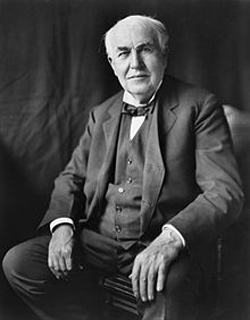News From David Grindle, USITT Executive Director
Research – The Questions that Need to Be Asked
Failure Is Not an Option
That is one of my son's favorite t-shirts. It features those words and the logo of the Apollo 13 mission. In that case, yes, failure was not an option.
I think we have come to the intransigent thought that this is now always the case. I wholly disagree. Failure is an option, and much can be learned from it.

Thomas Edison
Thomas Edison famously said, "I have not failed. I've just found 10,000 ways that won't work."
USITT offers grants for research, and each year the pool of applicants is, frankly, too small. Our academic theatres say they are constantly fighting to show their worth in research institutions, but where are the grant applications? We do research every day thanks to the marvelous brains of designers who come up with amazing, creative ideas. So how do we realize them? Research. Trial and error. Putting ideas to work.
USITT has funded the research that gave us LEDs in stage lighting and created the DMX code and gave it to the world. We are home to some great research opportunities for individuals whether in an academic situation or not. We must seek to research not only our past (most of our applications are for historical research) but must seek to advance the future. That is the heart of what this Institute was founded on – sharing ideas and exploring to advance the art. Our oldest fund in the Institute is the Edward F. Kook Fund, which is there to provide funding for research!
Failure is an option in research, but somewhere the pressures of life have made us think this is not true. How many plays, musicals, or operas come to the stage and flop only to soar with rewriting and restructuring (or recasting, or re - lots of things). That's artistic research. Failure is painful and, in a world that is expected to produce instant profit, under-valued.
Perhaps that is part of our issue. In a world where we get impatient if e-mails take more than two seconds to cross the room or even the globe, perhaps we aren't patient enough to research and see if something works. Perhaps we see failure of an idea or experiment as a condemnation of our intellectual ability rather a small step forward in furthering understanding.


We'd like to hear your comments on this story.
Please e-mail David at david@usitt.org.